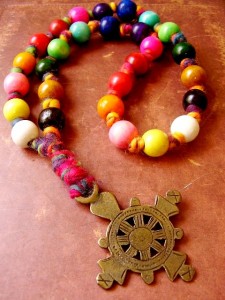Teresa’s Story
 Part two of seven
Part two of seven
RTE: Teresa, how did the Rasta movement fit for you?
TERESA: I wasn’t as into the music. What I liked was that they lived a simple life, that they lived “Ital”1 – no white flour, no white sugar, no pop, nothing processed, no meat. That was something I wanted also; I didn’t want to eat anything that wasn’t directly from the land (although I must admit that I had a sweet-tooth). Also, to be honest, we were both heavy herb smokers, and with the Rastas we could smoke as much as we wanted. I also liked the idea that we are all created equal. Mike and I both had black and Mexican friends at school and we didn’t fit with the white-only crowds. We didn’t want to go to college and do the career thing, and I didn’t want to contribute to the image of a successful young white American woman. I wasfine with being a service worker.
Mike was the one that was into the music. I just loved Mike. My feeling was,
“Whatever you want to do, let’s do that – just let me have my garden.”
I was happy having a job and friends. I never wanted to be anything. I just wanted to be nice to people, to grow our food, and to praise God in my own inner way.
Whatever Mike is into he researches to the nth degree, but I’m not like that. I wait for things to come to me. While he was reading Rasta, I was reading other things like the Baghavad Gita, the writings of the Catholic priest Henri Nouwen, books on Zen Buddhism, whatever came my way. I was having a very hard time with the concepts of war, suffering, racism, class distinctions, and these books helped me. At the time I thought,
“Maybe I’m Rasta, maybe I’m not.”
Rasta did give me a sense of womanhood though. On our first trip to Jamaica, I saw a woman with a long dress and with her hair covered, and I thought,
“Now that’s beautiful. That’s me. That’s the image I want to have. I want to be seen as a roots woman: natural, loving, kind, compassionate, spiritual.”
So, although we were married, lived together, and loved each other, we also had our own spiritual identities. Michael is loving and our relationship has always allowed for individuality.
RTE: How did you maintain your lifestyle?
TERESA: We’ve tried to keep things simple by eating healthy, buying our clothes and things second-hand, growing as much of our own food as possible, learning how to self-medicate with herbs instead of prescription drugs, not having anything we can’t buy with cash…nothing on credit cards. Besides the garden and raising our son, I’ve had general service jobs like being a produce stocker at the local grocery store, a field worker picking vegetables and flowers, and at one time I produced tofu, a staple food for vegetarians. Now, I’m a home health aide.
RTE: And you Michael?
MICHAEL: I work at an old theatre called Liberty Hall in Lawrence, Kansas. When it was built, it was one of only two theatres in a four-state area, and played W.C. Fields, Buster Keaton, Laurel and Hardy. We still do movies, but now we also have live shows. We have a little theatre with 300 seats, and a big theatre with 700, and feature everything from classical music to Bob Marley’s kids. I’ve worked there for seventeen years as the janitor. I take care of the building.
RTE: When you began, how did the Rasta movement break down ethnically?
MICHAEL: It was very small and, here in the U.S., about 90 percent white. In Jamaica it was almost all black, with only a few whites. Rasta wasn’t organized, although there were some independent elders and a few different factions: “The Twelve Tribes of Israel,” who were mostly professionals (doctors, lawyers, teachers, and their children); the “Ethiopian World Federation,” which includes some of the older people from the Garvey era who were still in communication with Ethiopia; and the “Nyabinghi” Rasta, who were more militant. They had ceremonies that lasted up to a week, revolving around certain Ethiopian holidays, or His Majesty Haile Selassie’s life.
They would drum and sing what I’ve come to understand were old Christian spirituals, songs that they’d learned in church when they were young. They would take the word “God” out, and replace it with “Rastafari” or “Jah,” from Jehovah. But we weren’t aware of those origins in the early days; to us they wrote those songs.

Leave a Reply